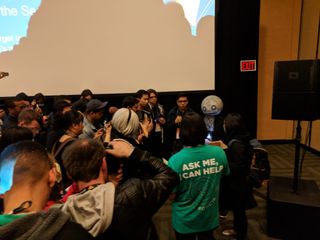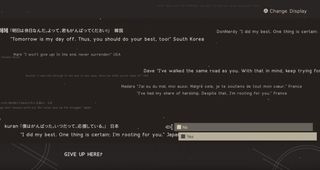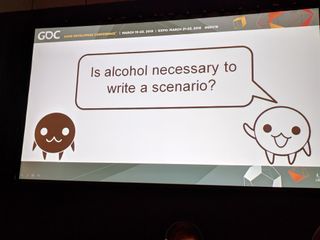Yoko Taro explains how a Coca Cola ad inspired Nier: Automata
"I wanted them to realize that the person they're directing hatred towards is also, just like themselves, a gamer."

At a GDC panel about the creation of Nier: Automata today, director Yoko Taro talked a little bit about his creative process—alcohol helps him loosen up and be a better writer, but also causes him to go to sleep very quickly—and inspirations for his game. The first Nier, released on PS3 and Xbox in 2010, essentially ripped its map design from The Legend of Zelda: Ocarina of Time. One part of Nier: Automata, one of our favorite games of last year, drew inspiration from a much weirder source: a Coca Cola ad campaign called A Small World.
Warning: Mild spoilers for Nier: Automata's ending below.
We're capable of easily detesting people that we have never met or seen or heard of before.
Yoko Taro
After Nier: Automata's true ending, you can leave a message of encouragement for other players who are struggling to finish. Those messages show up for players as they fight their way through Ending E. The messages appear in multiple languages, and show what country they came from.
"The truth is, this genius idea is not mine," Yoko Taro said, speaking through a translator. "I stole this one too. It's from a campaign called the Coca Cola Small World Machine. This is a campaign that Coca Cola deployed between two countries that are on bad terms. It's a story between how can people still get along, even though they may have disagreements on their countries, situations, and societies. It is something that I was very deeply inspired and influenced by."
Small World was a campaign Coke ran several years ago in India and Pakistan. There was more to it than a video showing people from the two countries drinking a Coke and going "ahhh." Cameras and touchscreens built into the Coca Cola machines let people in India and Pakistan see each other in real time and play simple games.
"That project left an extremely strong impression on me," Yoko Taro said. "You don't have to look very hard in real world society to see that it's overflowing with hatred. We're capable of easily detesting people that we have never met or seen or heard of before, and I was really impressed by this project and what it was trying to do. So just like what Coca Cola did, I wanted to use this final message in Nier: Automata, this screen you see here, to communicate something by having people share messages with people from other countries that they have not-so-great relationships with. I wanted them to realize that the person they're directing hatred towards is also, just like themselves, a gamer."

Yoko went on to say that he actually gave up on that idea, because he felt like it would mean "imposing my own principles onto others." Instead, the developers decided to have those messages come from a random assortment of countries. But the spirit of the Coke project obviously stuck with him.
The biggest gaming news, reviews and hardware deals
Keep up to date with the most important stories and the best deals, as picked by the PC Gamer team.
"I believe videogames should allow players the freedom to make their own decisions and not have the opinions of creators, like myself, forced upon them. I don't know what a player will think when they see this, or what you guys all thought when you saw this. That's exactly the kind of videogame freedom I wanted to make this time. Having said that, if I were to have a personal wish, or thought, of my own, just like I was influenced by the Coca Cola campaign, I hope that the people that played this game took the time to think about someone they don't know in a faraway country, even if it's just for a little bit. That would make me extremely happy, and secretly that's all I hope for."


Wes has been covering games and hardware for more than 10 years, first at tech sites like The Wirecutter and Tested before joining the PC Gamer team in 2014. Wes plays a little bit of everything, but he'll always jump at the chance to cover emulation and Japanese games.
When he's not obsessively optimizing and re-optimizing a tangle of conveyor belts in Satisfactory (it's really becoming a problem), he's probably playing a 20-year-old Final Fantasy or some opaque ASCII roguelike. With a focus on writing and editing features, he seeks out personal stories and in-depth histories from the corners of PC gaming and its niche communities. 50% pizza by volume (deep dish, to be specific).
Most Popular







